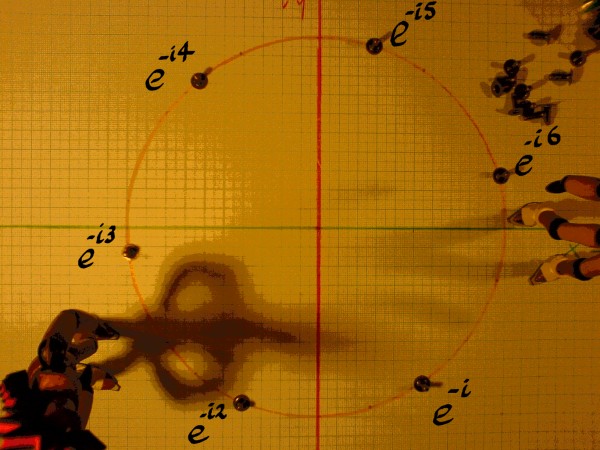
The Branch Cut
The complex plane may seem a peaceful place, with it's unit circle
where numbers keep going round instead of flying to some infinity. But
it is also a place full of surprises. If numbers go round, must there
not be a point where they meet their own self?
Say you multiply the complex exponential e(0+i), which is
ei, several times with itself. That is easy, as it is
already expressed as
an imaginary power of e, so you can double, triple, quadruple etc the
exponent:
 |
The same thing can be done with e(0-i) and it's powers.
 |
Negative powers mix with positive powers. They have no separate
domain.
 |
The overlap will even extend more when multiplication is continued
beyond
one cycle, with powers ei7, ei8
etcetera, and their negative
counterparts. Before you know it, you have your whole complex plane
messed up with all sorts of frequencies mingled beyond distinction.
 |
Complex vectors (x+iy) all have their unique location on the complex
plane, but when expressed as complex exponentials, that is no longer
the case. An exponential eiß is on the same location
as ei(ß+2pi) and infinitely many others. They are
periodical modulo 2pi.
This overlap is an inescapable fact. In some cases it is
advantageous. But it also relates to some tough problems in digital
signal processing,
such as aliasing and imaging.
To track what is exactly happening, it
can be fruitful to regard the complex plane not as just one plane, but
a whole stack of complex plane sheets.
 |
Such sheets they call branches. Everytime you go more than a full
cycle, you trespass a branch cut somewhere, and land on a next branch.
Or a previous, depending on your direction.
Where is that branch cut, what does it look like, how do you pass
from one branch to another?
 |
The branch cut will be right through the negative x-axis, from the origin to minus infinity. At least for dsp that is the best place to do it.
 |
Instead of endlessly going round on the same plane, there is now
something like a smooth spiral staircase of planes where you go up or
down. Depending on the type of operation, trespassing the branch cut
may be equivalent to entering the alias range.
I have tried to model such a spiral complex plane from sheets of
paper. But it is impossible. The sheets will be stuck together tightly
at the point of the origin, so the whole thing cannot be stretched to a
3D object.
Anyway, the stack-of-sheets-interpretation in itself does not alter
the numbers, or the overlap issue. Rather, it is an intro to complex
logarithms. And these do transform the complex plane in a spectacular
way. That is for a next episode.